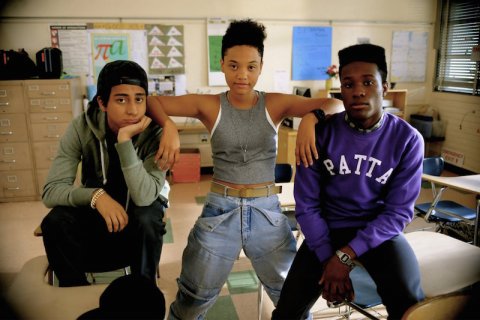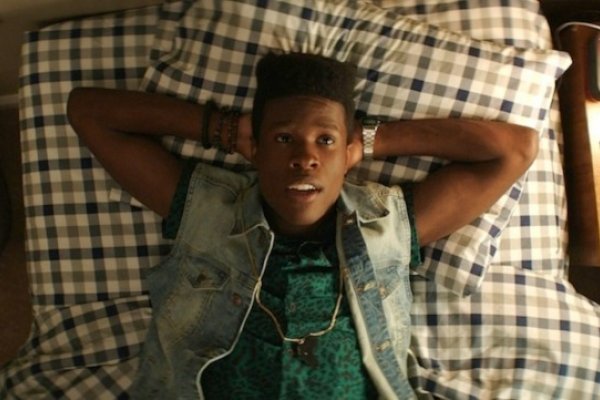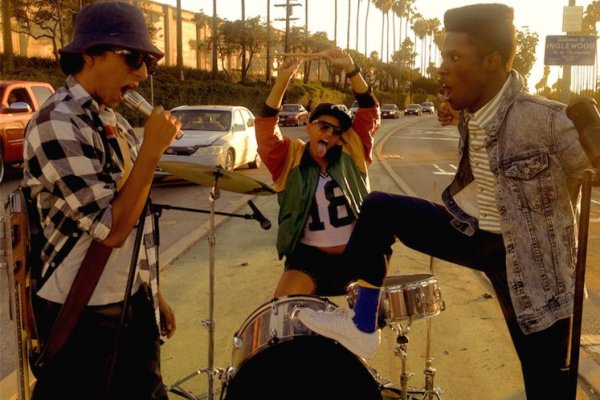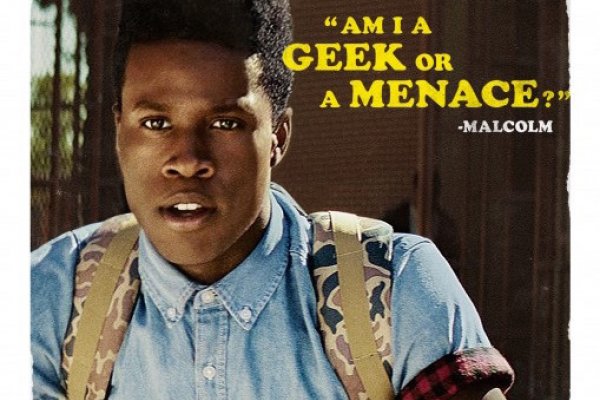
Dope is essentially a black cinematic Magic Kingdom, shifting “The Most Magical Place on Earth” from the theme park to the trap. The film recounts the legendary tale of a Boyz-N-The-Hood-travel-Back-To-The-Future-House-Party trio surviving and thriving. Malcolm, Diggy, and Jib are essentially good kids blossoming in a m.a.a.d. city – like clever roses growing from the concrete. They may be starting from the bottom – literally their LA neighborhood is called the Bottoms – but they refuse to let it stop them from being great. However, after they wild out at a birthday party-turned-shootout-and-raid for local drug dealer Dom (aka A$AP Rocky as mostly himself), their lives go 0 to 100 real quick. The three geeky, 90s obsessed Musketeers wind up as central players in an outlandish game of trap-or-die Twister. Much to the viewer’s delight, they spend the film balancing and Humpty dancing on the teetering edge of the limb-of-possibility. And to make things even more interesting, Malcolm’s ambitions are specifically directed 3,000 miles beyond city limits to a brick-sidewalked, Northeastern pocket of prestige and international brand of exceptionality: Harvard University.

Throughout Dope’s narrative whirlwind, hip-hop holds tremendous weight, grounding its allure while also nourishing each scenario with vibrancy. Primarily and most significantly, the film’s soundtrack followed the trend of all good movies and functions as a conglomerate of quality and cool. Specifically, funky ageless Pharrell executive produced the soundtrack, and the track list includes a variety of 90s hip-hop classics as well as punk of fusion tracks. Next, the elements of hip-hop extend beyond the actual music itself. For example, rapper A$AP Rocky plays a fairly important role in the plot’s unfolding. There are also appearances from Vince Staples, Casey, Veggies, Kap G, and Tyga – who somehow managed to be killed quicker than Chris Brown in Stomp the Yard. Also, there’s an obvious plethora of hip-hop references starting with the title itself to Malcolm’s concluding assertion of “allow me to re-introduce myself” – a nod to JayZ’s play on a “Humpty Dance” lyric on his Black Album. More randomly, Malcolm’s backstory instantly made me think, “that sounds sort of like Tyler, The Creator” considering he is also from the LA area, was raised by a singe mother, doesn’t know his Nigerian father. Tyler also similarly challenges conceptions of blackness, actively pushing hip-hop – and generally life – boundaries in his own music and with Odd Future in their many wildly carefree creative endeavors. Appropriately enough, the film’s writer/director, Rick Famuyiwa (The Wood, Brown Sugar), described the film as coming into being while he listened to A$AP Rocky, Kendrick Lamar, and Tyler, The Creator.
Though Dope has many explicit 90s connections and references, the more subtle, low-key nods add a pinch of extra spice to the film. For example, Dope’s central love interest, dawns long box braids (but thinner) a la Janet Jackson in Poetic Justice (1994). Also, the actress playing this love interest is Zoe Kravitz, the daughter of former idyllic bohemian couple Lisa Bonet and Lenny Kravitz – though she is definitely a rising star in her own right. On top of that, as a sort of self-sample, Stacey, the security guard at Malcolm’s high school, is the same Stacey from Famuyiwa’s 1999 hit The Wood.

Overall, Rick Famuyiwa definitely popped that imagination as he whipped up a definitively hip-hop “loss-of-innocence” cocktail that pushes boundaries and flexes euphoric charisma. However, as far as execution of intention goes, Dope went for an out-of-the-park home run to the tune of My Beautiful Dark Twisted Fantasy, but only managed to clumsily slide into second base.
Yes, the film questions ideas of how we label others and how we more particularly view people of color, especially when they hail from low-income communities. In particular, Dope pushes back against limitations on blackness, highlighting the multi-hued diversity and dimensionality among those who identify as black. It connects to Kendrick Lamar’s “Mortal Man” in that, “although the butterfly and the caterpillar are completely different, they are one in the same.” Yes, I appreciated how it treated Diggy’s queerness as something that just is. The film’s attitude was more relaxed, basically presenting it as “oh yeah, that’s just how she is, next.” And absolutely, it was cool to hear some dialogue surrounding the use of nigga, as the word remains a source of great debate. Considering hip-hop influences mainstream determinations of “cool” and that mainstream is largely white, there is the unremitting question of whether or not its usage is appropriate in music and beyond. Even further, it is undeniably relevant and real despite its fantastical Grimm brothers “Little Geeky Aweerohs (Oreos) in the Hood” plotline. It is this element of absurdity that makes Dope captivating and compelling for viewers. (I mean, we have three kids successfully moving that dope using their school’s computers and science lab so one of them can go to Harvard; if that isn’t wild and attention-grabbing I don’t know what is.) At the same time, Level 6 of the Kobe System challenges us to be a different animal and the same beast and if Kanye’s records can break more records, then we definitely have to dig deeper.

First, the questioning of labels and stereotyping of people of color, especially in low-income communities, remains nonetheless intertwined with the idea that the only way to “achieve” and “overcome” is “out” and through education. Praising the one – for all intents and purposes the “exceptional Negro” – who “defied the odds” and “worked hard to pull themselves up by their bootstraps” doesn’t change a community. Does Drake say, “Started from the bottom, now I’m here”? No, he raps that “we” are here – in fact the whole team’s here – and the story never changed because his community built him. At the same time, if home is where the hatred is, then achieving means leaving. This, among other things, demonstrates how it is bigger than the individual in success and the lack thereof. Hov said he did that so hopefully you won’t have to go through that, but what else is a thug to do when you eat cheese from the government? Generally, the film wasn’t interested in exploring the role of systemic inequality in creating the situation encompassing and reinforcing life in the Bottoms. As we discuss the majestic defiance of roses springing from concrete, we must also look to the concrete and why it isn’t conducive to the growth of more roses beyond especially exceptional breeds.
Finally, the film’s overall portrayal of women – with exception to Diggy – is essentially static and shallow, as if they were an afterthought. Rick Famuyiwa directly stated that he wanted to challenge the hyper-aggressive, predatory conceptions of black men, and that was it. Such intentionality failed to similarly translate into width and extension in conceptualizing femininity and gender roles. The female characters mostly exist within a lusty, objectified space, coveted like sexual prizes as their thin, lighter-skinned physiques exude Eurocentric ideals of beauty and attraction. In this way, Dope’s alignment with one of hip-hop’s greatest controversies is disappointing.
All that being said, I see Dope as an artfully offbeat cousin to the successful comedic black dramas of the 90s. It mixes that humor and stylistic flare of the past with a huge scoop of technology and a ton of fresh-yet-awkward charm. Add a few too many dashes of the problematic, generously coat with sweet imagination, and the result is a flavorfully magnetic film that is worth your time and your critique.
Brionna Atkins is a rising senior at Harvard studying Sociology. She strongly believes reality is socially and individually constructed, so fighting the power means unraveling the symbolic universe. Revolutionary love, hiphop - from A Tribe Called Quest to Travi$ Scott - and hyperbole are her preferred weapons of choice. Follow her @gotbri and check out her blog: cloudemergent.wordpress.com
